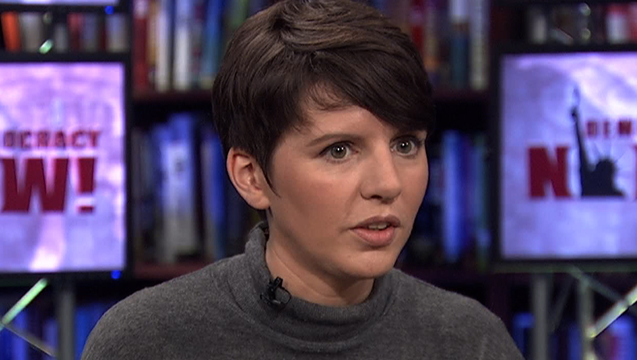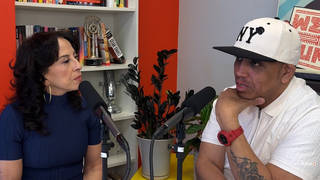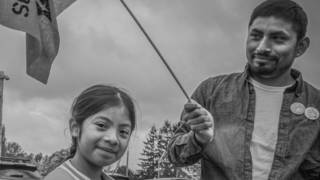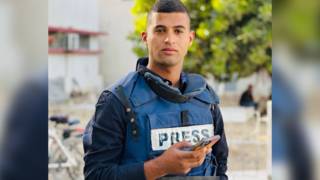
Temas
En Yemen se desencadenó una ofensiva respaldada por EE.UU. contra Al Qaeda en la Península Arábiga. Ayer, cuatro civiles fueron asesinados y tres resultaron heridos cuando el vehículo en el que circulaban fue alcanzado por un proyectil, en la provincia Shabwa al sur del país. En abril, el presidente yemení, Abed Rabbo Mansour Hadi, se embarcó en una guerra total contra Al Qaeda y empezó una serie de intensos ataques aéreos. Desde entonces, aproximadamente 21 mil personas han sido desplazadas, en medio de los enfrentamientos. Mientras tanto, el gobierno reprimió a los periodistas locales y deportó a los últimos periodistas extranjeros que quedaban. Nos acompaña en el estudio Iona Craig, que fue la última periodista extranjera acreditada en Yemen, hasta hace poco. Dejó el país la semana pasada, luego de que sus fuentes le informaran que el gobierno tenía planeado deportarla a ella también.
Transcripción
JUAN GONZÁLEZ: We turn now to Yemen, where a U.S.-backed offensive against al-Qaeda in the Arabian Peninsula rages on. Yesterday, four civilians were killed and three were injured when their vehicle was shelled in the country’s southern Shabwa province. In April, Yemen’s president embarked on an all-out war against al-Qaeda and began a series of heavy air strikes. Since then, an estimated 21,000 people have been displaced amidst the fighting.
AMY GOODMAN: Meanwhile, the government has cracked down on the media. Earlier this month, journalist Adam Baron was deported from Yemen after reporting from there for three years for McClatchy and The Christian Science Monitor. He was deported a day after the United States closed its embassy in Sana’a over security fears. Then Yemeni authorities called staff at Al Jazeera Arabic and ordered a reporter and cameraman who were covering the fighting in the Shabwa province to leave the area.
Soon after, journalist Iona Craig left the country after hearing from her sources the government intended to deport her, too. She was the last accredited foreign reporter in Yemen. Iona Craig joins us here in New York. She’s been based in Sana’a for the last three-and-a-half years. She’s the Yemen correspondent for The Times of London.
Welcome back to Democracy Now! Nice to have you in studio for the first time, Iona. What is happening right now in Yemen?
IONA CRAIG: I think now it’s very tense times. We’ve got this conflict that’s been going on now for almost a month. It’s very difficult to know exactly what’s going on on the ground, but it is certainly the most significant assault against—a military offensive against al-Qaeda, I think, ever in Yemen. And that is causing a kind of backlash with—of the issues then in Sana’a, of al-Qaeda then carrying out assassinations, IED attacks, as a kind of retaliatory against this military offensive. So, in a security perspective, things are very tense, and the security situation is pretty dire. And on a day-to-day basis for Yemenis, the economy is declining. There’s a major fuel shortage at the moment, which means that people are having issues in even just pumping water, so the price of water has doubled in the last month. And so, just on a day-to-day basis for Yemenis, aside from the security issues, it’s a real struggle at the moment. So, yeah, it’s pretty tough in Yemen for people right now.
JUAN GONZÁLEZ: And what was the impact of the Arab Spring protests in Yemen on the—on government policy or on any kinds of social reforms?
IONA CRAIG: Well, at the moment, we’re in this period of transition. So, after 2011, Ali Abdullah Saleh, the former president who had been in power for 33 years, he stepped down. There was then this slightly farcical situation of a one-man election, and the vice president was voted in. This transition process was, in theory, only supposed to sort of take about two years, initially, to then have elections. That has obviously gone on and on, and there was a period of national dialogue that was then extended. And at the moment, Yemen is now trying to build a new—or create a new constitution. So, within that, there will be a new system in Yemen of federalism. What that’s going to look like, we don’t know yet. And obviously, hopefully, as well, those issues that were brought up in the national dialogue relating to social structure and things like that will also be included in that constitution, but it’s a long, long process.
AMY GOODMAN: Talk about the drone strikes in Yemen, who has been involved with them—the Yemeni government, military, U.S. military.
IONA CRAIG: Yeah, I mean, the issue of the drone strikes, of course, in Pakistan we’ve seen a real drop-off, and in Yemen that hasn’t been the case. And I think more troubling in Yemen has been the issue of civilian casualties, which has been a problem. And that really brings into question the whole issue of intelligence between the Yemeni government, the Americans, Saudi, obviously, involvement with that. But, you know, the most infamous case recently being the 12 civilians that were killed in a drone strike back in December is where that intelligence is coming from, how it is possibly being manipulated, and how reliable it is, when you’ve got civilian casualties being, you know, as a result of these drone strikes. But they’re still being used. And, you know, this military offensive that’s going on at the moment was launched by three days of aerial bombardment by the Yemeni air force, U.S. drones, possibly even U.S. naval bombardments from the sea, which have been used before. And so, yes, they’re still being used as part, actually, of this conflict that’s going on in the moment, as well as sort of more targeted killing out in rural areas beyond where this conflict is happening at the moment.
JUAN GONZÁLEZ: Well, you mentioned that drone strike in December. Earlier this year, Human Rights Watch said that the drone strike failed to comply with rules imposed by President Obama last year to protect civilians. Human Rights Watch concluded that the attack killed 12 men, ages 20 to 65, and wounded 15 others. They were taking part in a wedding procession. This is a clip of a video that accompanied the Human Rights Watch report.
ABDULLAH MUHAMMAD AL-TISI: [translated] The U.S. government made a big mistake. They killed innocent people. This was a serious crime. They turned many kids into orphans, many wives into widows. Many were killed, and many others were injured, although everyone was innocent.
JUAN GONZÁLEZ: What’s the impact of this drone strike and others in terms of the Yemeni population?
IONA CRAIG: I actually went down there six days after that strike happened. I spoke to a lot of the families who had lost family members. I spoke to some of the survivors, as well. And I think the big problem, particularly in instances like that where you have a large number of civilian casualties, is the total wall of silence that it’s met with by Washington. There is no admittance that an error has been made. It’s left to the Yemeni government to then pick up the pieces, to try and mediate with the local tribes. I mean, there was fighting every night down there, in that area where that drone strike happened, between whether it was Ansar al-Sharia or local tribes—even the local people didn’t know—and the military, as a direct result of that drone strike, because people were angry about it.
And when there’s this kind of wall of silence from Washington, you’ve got this slightly ridiculous situation in Yemen at the moment where the government has been willing now to admit when they’ve killed civilians. For example, in the last couple of weeks, there were tribesmen who were killed in Sana’a that the government claimed were al-Qaeda originally. They then came out with a statement just a few days ago and admitted that they were civilians, that they were not al-Qaeda. In return, al-Qaeda themselves, when they carried out an operation in December and they killed civilians, they put out a video release saying, “We’re sorry. We killed civilians. This shouldn’t have happened. We’re going to offer compensation.” So you’ve got the Yemeni government willing to admit when they’ve done wrong, al-Qaeda on the other side, but in the middle, when Washington does this or the Americans are responsible, there’s nothing. There’s a wall of silence. And this is a propaganda war really now in Yemen. So, when you’ve got the government wishing, you know—willing, sorry, to admit that they’ve done something wrong and al-Qaeda, but not the U.S. in between, they’re losing that propaganda war. They’re really losing a lot on that by not speaking out when they—when these errors happen.
AMY GOODMAN: Iona Craig, the Obama administration says it will release the secret government memo that authorizes the killing of Americans overseas. A federal appeals court ordered the memo’s disclosure after The New York Times and ACLU sued, after the killings of Anwar al-Awlaki, his son Abdulrahman Awlaki, as well as Samir Khan—three U.S. citizens. Talk about the significance of this. It’s supposed to be released now, any day now, in exchange for David Barron to become a federal appeals court judge, which he has become.
IONA CRAIG: I think this is all about the issue of transparency, of course. You know, this was something Obama said in May last year—we’re going to be more transparent about the drone program—and it just hasn’t happened. I mean, obviously, for Yemenis, they want the same for their citizens, in the sense of why are people targeted, how do they end up on the so-called list. Even when people are killed, what threat did they even pose to America? A lot of the times we don’t even know the identity of people being killed. So, as much as this is important to see this from a U.S. citizen’s perspective, it’s still a long way off finding out the same reasons behind why Yemenis are targeted or other individuals in Yemen are targeted. But when it’s—when you’re trying to push toward some form of transparency, I guess it’s—you know, it’s a step in the right direction. But it’s still always very unclear in Yemen what threat these individuals pose, because most of the people who have been killed on the ground in Yemen, on the vast majority of cases, these are just foot soldiers. These are people—you know, I visited areas where there are bodies still lying in the morgue months later after they’ve been killed, because nobody knows who they are. They haven’t been identified.
JUAN GONZÁLEZ: And we just have about 30 seconds, but the impact of expelling so many foreign journalists? You were the last foreign accredited journalist in Yemen, what that means?
IONA CRAIG: I chose to leave. You know, that was a personal choice. And I hope to go back, although I don’t know how easy it will be to do that. But I think the thing we have to watch for is how the local journalists are treated now. It doesn’t really matter about the foreigners, in the sense that the worst they’re going to do is kick them out of the country. They’ll not get treated badly. It’s the local journalists, that they’re the ones that face physical attack, imprisonment and worse, and particularly with this offensive going on in Shabwa. You mentioned earlier about the Al Jazeera journalist who was kicked out of the province trying to cover that conflict. And we have no indication of independent verification of, you know, civilian casualties, how the local population is coping in that conflict. All we have is information from the government or from al-Qaeda. And that’s where you see the local journalists are really important in getting the information out. And I think it’s very troubling when the government is preventing that from happening.
AMY GOODMAN: I want to thank you, Iona Craig, for being with us, journalist who’s been based in Sana’a for the last three-and-a-half years. She’s the Yemen correspondent for The Times of London. We’ll continue to talk to you.






